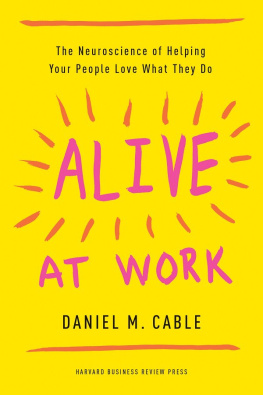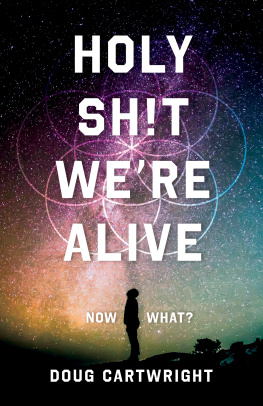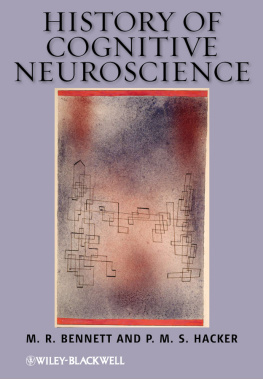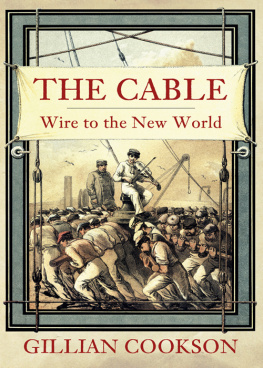Cable - Alive at Work: The Neuroscience of Helping Your People Love What They Do
Here you can read online Cable - Alive at Work: The Neuroscience of Helping Your People Love What They Do full text of the book (entire story) in english for free. Download pdf and epub, get meaning, cover and reviews about this ebook. City: Boston;Massachusetts, year: 2018, publisher: Harvard Business Review Press, genre: Politics. Description of the work, (preface) as well as reviews are available. Best literature library LitArk.com created for fans of good reading and offers a wide selection of genres:
Romance novel
Science fiction
Adventure
Detective
Science
History
Home and family
Prose
Art
Politics
Computer
Non-fiction
Religion
Business
Children
Humor
Choose a favorite category and find really read worthwhile books. Enjoy immersion in the world of imagination, feel the emotions of the characters or learn something new for yourself, make an fascinating discovery.
- Book:Alive at Work: The Neuroscience of Helping Your People Love What They Do
- Author:
- Publisher:Harvard Business Review Press
- Genre:
- Year:2018
- City:Boston;Massachusetts
- Rating:3 / 5
- Favourites:Add to favourites
- Your mark:
- 60
- 1
- 2
- 3
- 4
- 5
Alive at Work: The Neuroscience of Helping Your People Love What They Do: summary, description and annotation
We offer to read an annotation, description, summary or preface (depends on what the author of the book "Alive at Work: The Neuroscience of Helping Your People Love What They Do" wrote himself). If you haven't found the necessary information about the book — write in the comments, we will try to find it.
Cable: author's other books
Who wrote Alive at Work: The Neuroscience of Helping Your People Love What They Do? Find out the surname, the name of the author of the book and a list of all author's works by series.
Alive at Work: The Neuroscience of Helping Your People Love What They Do — read online for free the complete book (whole text) full work
Below is the text of the book, divided by pages. System saving the place of the last page read, allows you to conveniently read the book "Alive at Work: The Neuroscience of Helping Your People Love What They Do" online for free, without having to search again every time where you left off. Put a bookmark, and you can go to the page where you finished reading at any time.
Font size:
Interval:
Bookmark:

HBR Press Quantity Sales Discounts
Harvard Business Review Press titles are available at signifi cant quantity discounts when purchased in bulk for client gifts, sales promotions, and premiums. Special editions, including books with corporate logos, customized covers, and letters from the company or CEO printed in the front matter, as well as excerpts of existing books, can also be created in large quantities for special needs.
For details and discount information for both print and ebook formats, contact booksales@harvardbusiness.org, tel. 800-988-0886, or www.hbr.org/bulksales.
Copyright 2018 Daniel M. Cable
All rights reserved
No part of this publication may be reproduced, stored in or introduced into a retrieval system, or transmitted, in any form, or by any means (electronic, mechanical, photocopying, recording, or otherwise), without the prior permission of the publisher. Requests for permission should be directed to permissions@hbsp.harvard.edu, or mailed to Permissions, Harvard Business School Publishing, 60 Harvard Way, Boston, Massachusetts 02163.
First eBook Edition: Mar 2018
ISBN: 978-1-63369-425-5
eISBN: 978-1-63369-426-2
to Daisy and Violet
I wonder what my soul does all day when Im at work.
Graffiti seen in London
Lets start with a couple of questions. Are you excited about your work? Or does work make you feel like you need to shut off in order to get through it?
If you answered yes to the first question, youre in the fortunate minority. But, if youre in a position to lead and motivate others, theres still a good chance that those who fall under your leadership would answer no.
According to both US and global Gallup polls, about 80 percent of workers dont feel that they can be their best at work, and
These numbers are alarming but, sadly, theyre probably not surprising to you. I think all leaders know in their guts that engagement is an issue. Why? For one, weve all struggled with it ourselves. As a friend told me recently, Sure, work sucks thats why they call it work. At one point or other, weve all felt dulled by what we do at workbored and creatively bankrupt. Weve sometimes lost our zest for our jobs and accepted working as a sort of long commute to the weekend.
Yet even though weve all been there, it can be frustrating when our people arent living up to their potential. Its exasperating when employees are disengaged and dont seem to view their work as meaningful.
It can be hard to remember that employees dont usually succumb to these negative responses for a lack of trying. They want to feel motivated. They seek meaning from their jobs. But some realities of organizational life are preventing them from feeling alive at work.
Heres a real-life example. When Tom started his gig after college designing and maintaining the website of a Big 4 accounting firm, he was excited. The pay was great, much better than the other two offers he had received, and he was told that there were lots of opportunities for personal growth.
The honeymoon didnt last long. As Tom recalled: I soon found out my supervisor had no time or patience for experimenting. He was more concerned with protocol than personal development. Its like hes afraid of me trying new things because it might not go exactly as planned. It doesnt exactly leave much room for learning.
At first, Tom wasnt deterred. He tried to keep an open mind and optimistic attitude. He worked to improve some processes and inject some personality into his work, which gave him boosts of confidence. Unfortunately, Toms boss was under pressure to meet website performance metrics, so she didnt have the flexibility to implement Toms ideas.
Tom began to shut off. He did his work and completed his tasks, but he was becoming disengaged and unmotivated. He felt he was performing a series of scripted actions. Worse, he felt as if his boss wasnt responding to his creative impulses. After a year, Toms tasks began to feel routine, small, and disconnected from a bigger picture.
Which is a shame. Its not as though Tom was a subpar performer who was only working for a paycheck. He was smart and talented, and he wanted to learn new things and expand his horizons. But his boss, he thought, was holding him back. So instead of contributing more to his employer, Tom looked elsewhere for fulfilment. While at work, he started bidding on website management projects via a freelancing app, and took on new projects that he was excited about. The irony was that his freelance work wasnt much different from his day job. But since it allowed him more ownership and freedom, it felt more meaningful to him.
Unfortunately, Tom isnt an outlier: hes like most employees in big organizations. As the Gallup studies suggest, a majority of employees dont feel they can be their best selves at work. They dont feel they can leverage their unique skills or find a sense of purpose in what they do. Most organizations arent tapping into their employees full potential, resulting in workplace malaise and dull performance.
Organizations are letting down their employees. We can do a much better job at maintaining their engagement with their work. But first, we need to understand that employees lack of engagement isnt really a motivational problem. Its a biological one.
Heres the thing: many organizations are deactivating the part of employees brains called the seeking system .
The seeking system is the part of the brain that encouraged our ancestors to explore beyond Africa. And that pushes us to
Exploring, experimenting, learning: this is the way were designed to live. And work, too. The problem is that our organizations werent designed to take advantage of peoples seeking systems. Thanks to the Industrial Revolutionwhen modern management was conceivedorganizations were purposely designed to suppress our natural impulses to learn and explore.
Think about it: in order to scale up organizations in the late 1800s, our species invented bureaucracy and management practices so that thousands of people could be controlled through measurement and monitoring. Because managers needed employees to focus on narrow tasks, they created policies that stifled employees desires to explore and try new things. These rules increased production and reliability, but reduced employees self-expression, ability to experiment and learn, and connection with the final product.
Unfortunately, many remnants of Industrial Revolution management still remain. In an overzealous quest to be competitive, ensure quality, and comply with regulations, most large organizations have designed work environments that make it difficult for employees to experiment, stretch beyond their specialized roles, leverage their unique skills, or see the ultimate impact of their
When people work under these conditions, they become cautious, anxious, and wary. They wish they could feel lit up and creative, but everything starts to feel like a hassle. They start to experience depressive symptoms: for example, a lot of headaches or trouble waking up and getting going in the Over time, they begin to believe that their current state is unchangeable, and they disengage from work.
But get this: our evolutionary tendency to disengage from tedious activities isnt a bug in our mental makeupits a feature . Its our bodys way of telling us that we were designed do better things. To keep exploring and learning. This is our biologyit is part of our adaptive unconscious
Font size:
Interval:
Bookmark:
Similar books «Alive at Work: The Neuroscience of Helping Your People Love What They Do»
Look at similar books to Alive at Work: The Neuroscience of Helping Your People Love What They Do. We have selected literature similar in name and meaning in the hope of providing readers with more options to find new, interesting, not yet read works.
Discussion, reviews of the book Alive at Work: The Neuroscience of Helping Your People Love What They Do and just readers' own opinions. Leave your comments, write what you think about the work, its meaning or the main characters. Specify what exactly you liked and what you didn't like, and why you think so.














